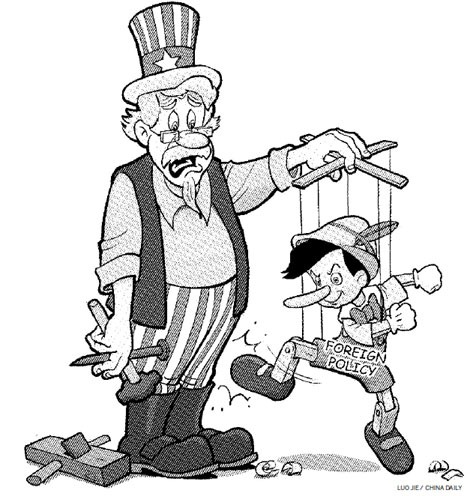US will rue its policy in Egypt
Updated: 2013-08-09 07:25
By Chu Zhaogen (China Daily)
|
|||||||||

Violence in Egypt has escalated since the army moved ousted president Mohamed Morsi to a secret location, where he is being held on accusations for having "conspired" with Gaza-based Hamas to carry out "hostile acts" inside Egypt. The bloodshed in late July, which followed by nationwide protests and clashes between Morsi's supporters and opponents in Alexandria, has raised concerns worldwide.
The day Morsi was ousted, US President Barack Obama urged the Egyptian military to "move quickly and responsibly to return full authority back to a democratically elected civilian government". During his visit to Cairo in mid-July, US Deputy Secretary of State William Burns had said that despite concerns over the chaos in Egypt, Washington believed that the ongoing transition is another opportunity for the country to create a democratic state that would protect human rights and the rule of law, and improve the livelihood of its people.
Washington's recognition of the so-called second revolution in Egypt and its refusal to call Morsi's ouster a coup may make the Muslim Brotherhood the biggest loser now, but in the long run, the US may have to pay a heavy price for that.
The democratic values and human rights the US has been championing around the world and its status as a leading defender of democracy have been questioned because of the double standard it adopts on democracy and the fight against terrorism in the Middle East. Many have criticized Washington for playing the puppet master in Morsi's administration but refusing to condemn the military's action.
A Middle East Online article, posted on July 23, says Morsi's ouster has put the US in a dilemma, which indicates the contradiction between the Obama administration's rhetoric and its policy to balance the promotion of democracy with perceived short-term interests.
The widespread mistrust in the US and the democratic values it promotes will undermine its soft power and, predictably, it will face increasing opposition when it tries to implement its regional strategy. As Sallama Shaker, visiting professor at Yale University and former Egyptian ambassador said recently: "Egypt is the largest country in the Arab world, and how it evolves politically and economically will have enormous impact on regional stability, serving as a template for other countries in the region."
Morsi won the 2012 election as a moderate Islamist candidate. His poll victory gave Islamist groups the opportunity to emerge from the shadows of the "clash of civilizations", but the repeated mistakes committed by the US have almost closed the window of opportunity for them to change their radical politics.
The same happened in Palestine a few years ago. After winning the Palestinian legislative election in 2006, Hamas nominated Ismail Haniyeh for the prime minister's post. But the then US president George W. Bush launched a vigorous diplomatic campaign to isolate Hamas and denied it the chance to change from an Islamist to a moderate Islamic group and participate in the Palestinian political process. This led to the de facto partition of Palestine, with Hamas controlling the Gaza Strip and rival Fatah running the government in the West Bank.
The situation in Egypt now is volatile. Muslim Brotherhood supporters are demanding the reinstatement of Morsi as the democratically elected president. They say that if the military's move is not opposed, it could topple the next democratically elected government too. It would not be an exaggeration to say that if Morsi is not reinstated it would signal the end of "political Islam", a movement that believes in peaceful and democratic changes, in Egypt. And people disillusioned with democracy could return to violence and radicalism again, which certainly will not be good news for the US.
The Egyptian military and US officials have said people wanted Morsi to quit because of his ties with China and Iran, and his failure to revive the economy. The fact is, Morsi refused to dance to Washington's tune and forged close ties with China, exhibiting his neutrality and thus angering American leaders. His other achievement was brokering a ceasefire between Israel and Hamas.
As far as Egypt's economic woes are concerned, they are the result of the domestic turmoil caused by the continued and irrational protests. The US should know that the ongoing chaos in Egypt could cause immense damage to American investments in the Middle East. George W. Bush's over-reliance on the military to achieve his foreign policy objectives in the Middle East was a tactical mistake. But by employing a hands-off policy in the Middle East in order to implement its "pivot-to-Asia" strategy to contain China, Obama is now committing a strategic mistake.
The US' policy shift from the Middle East to the Asia-Pacific has resulted in the deadly attack on the US consulate in Benghazi, Libya, and the ouster of Morsi in Egypt. From the Bush to the Obama administration, Washington's foreign policy initiatives have gone from bad to worse. The Obama administration's strategic goof-up could turn the Middle East into a more volatile region and create more trouble for the US in the coming years.
The author is a research scholar at Non-traditional Security and Peace Development Research Center, Zhejiang University.
(China Daily USA 08/09/2013 page16)
Most Viewed
Editor's Picks

|

|

|

|

|

|
Today's Top News
Pharm giant says it takes bribery claims 'seriously'
China's inflation rises 2.7% in July
Budget show cuts in provincial spending
US realty market 'connects dots' with China buyers
Pharm giant suspected of bribery
Economic prospects improved
Beijing rejects protest over patrol
China Unicom tests 4G network
US Weekly

|

|













